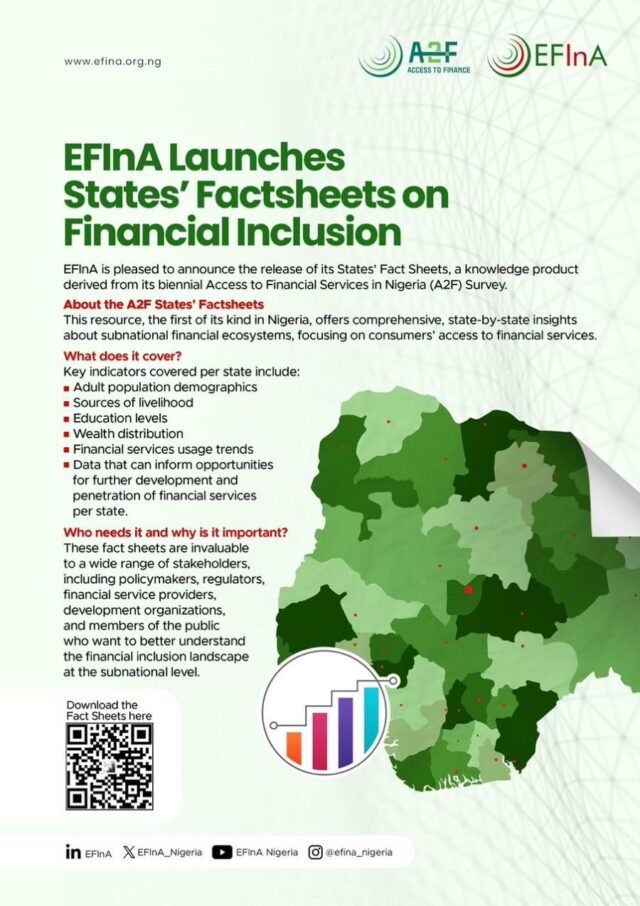…Southern states like Ekiti (77% banked), Delta (77%), and Edo (71%) demonstrate strong formal financial participation compared to northern states such as Katsina (30%), Kano (32%), and Kebbi (24%)
WED DEC 18 2024-theGBJournal| Enhancing Financial Innovation & Access (EFInA) on Wednesday released of its States’ Fact Sheets, the first resource of its kind in Nigeria, delivering a detailed, state-by-state analysis of subnational financial ecosystems.
The States’ Fact Sheets (A2F States’ Fact Sheets) is a comprehensive resource designed to shed light on the financial landscape across various states and provide actionable insights for policymakers, financial institutions, and development stakeholders.
The A2F State Factsheet reveals a diverse financial access landscape across Nigeria, highlighting areas of progress and persistent gaps.
Here are some of the standout findings:
-Banking Penetration Varies Greatly Across States: Banking penetration is highest in Kogi (94%), Lagos (91%), and Ekiti (77%), reflecting strong financial ecosystems in these regions.
However, states like Borno (13%), Yobe (22%), and Sokoto (22%) report significantly lower levels, underscoring challenges in reaching underserved populations. From 2020 to 2023, financial inclusion in Kogi State was driven by intervention schemes like the Anchor Borrowers’ Program, World Bank partnerships, and COVID-19 loans, which encouraged account opening.
Commodity-based cooperatives, particularly among rice farmers, benefited from targeted programs despite challenges with bank collateral requirements.
High literacy levels and mobile phone penetration (99% ownership) facilitated access to banking, while rural-urban migration increased the demand for remittance services. Financial service agents also expanded access in areas lacking bank branches.
-The Challenge of Financial Exclusion: Financial exclusion remains a pressing issue, with states like Borno (68%), Zamfara (57%), and Sokoto (60%) experiencing some of the highest levels of exclusion.
Conversely, states such as Lagos (2%), Delta (4%), and Kogi (3%) have made significant strides in reducing exclusion.
-The Role of Informal Financial Systems: Informal financial services remain prevalent in certain states, such as Ebonyi (37%) and Benue (24%).
These figures highlight the reliance on informal channels in areas where formal financial systems are less accessible.
-The “Other Formal” Opportunity: In some states, non-bank financial services such as mobile money are gaining traction. States like Kebbi (22%) and Kwara (22%) show relatively high reliance on “other formal” financial providers, presenting an opportunity to deepen financial inclusion through alternative channels.
-Regional Disparities in Financial Access: Southern states like Ekiti (77% banked), Delta (77%), and Edo (71%) demonstrate strong formal financial participation compared to northern states such as Katsina (30%), Kano (32%), and Kebbi (24%). Bridging these regional gaps will require tailored strategies that address unique state-level challenges.
-Exclusion in Conflict-Affected Areas: Conflict-affected regions face some of the highest financial exclusion rates. For example, 68% of adults in Borno and 45% in Taraba are excluded from financial services, emphasizing the need for innovative approaches in such areas.
States like Kogi (94%) and Lagos (91%) showcase the potential for widespread financial access through robust financial ecosystems. However, replicating this success in underrepresented regions remains a challenge.
States like Zamfara (57% excluded) and Sokoto (60% excluded) face significant barriers that demand targeted interventions. Informal financial services are crucial in areas like Ebonyi and Benue but must be complemented by efforts to bring these users into formal systems.
According to EFInA, the A2F State Factsheet is more than a document—it’s a tool for action.
”By understanding the financial landscape at the state level, we can collectively work towards a future where everyone has the tools they need to succeed economically.
This factsheet equips stakeholders with the insights they need to drive impactful change.”
This resource is tailored for:
-Sub-national actors: To craft targeted interventions that address state-specific financial inclusion gaps.
-Financial Institutions: To identify underserved markets and innovate solutions that meet local needs.
-Development Partners: To design impactful programs that align with the realities on the ground.
-Researchers and Advocates: To use data for deeper analysis and advocacy efforts.
Financial inclusion is critical to economic growth and poverty reduction. By providing granular, state-specific data, EFInA’s States’ Fact Sheets empower stakeholders with the insights needed to drive impactful change and expand access to financial services for all Nigerians.
EFInA is a leading financial sector development organisation working to promote financial inclusion in Nigeria. Through research, innovation grants, and advocacy, EFInA supports the development of inclusive financial systems that benefit the unbanked and underserved.
X-@theGBJournal|Facebook-the Government and Business Journal|email:gbj@govbusinessjournal.com|govandbusinessj@gmail.com










